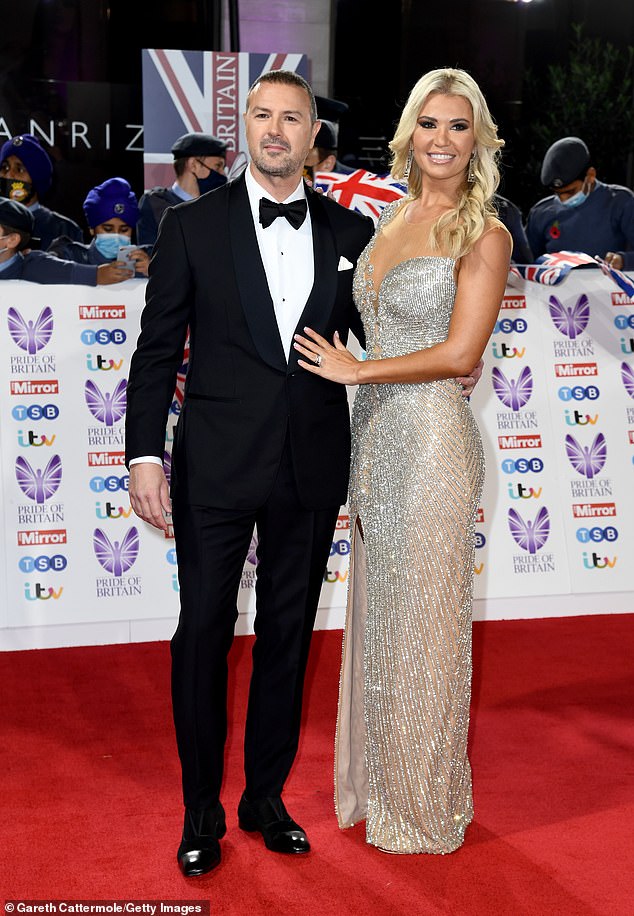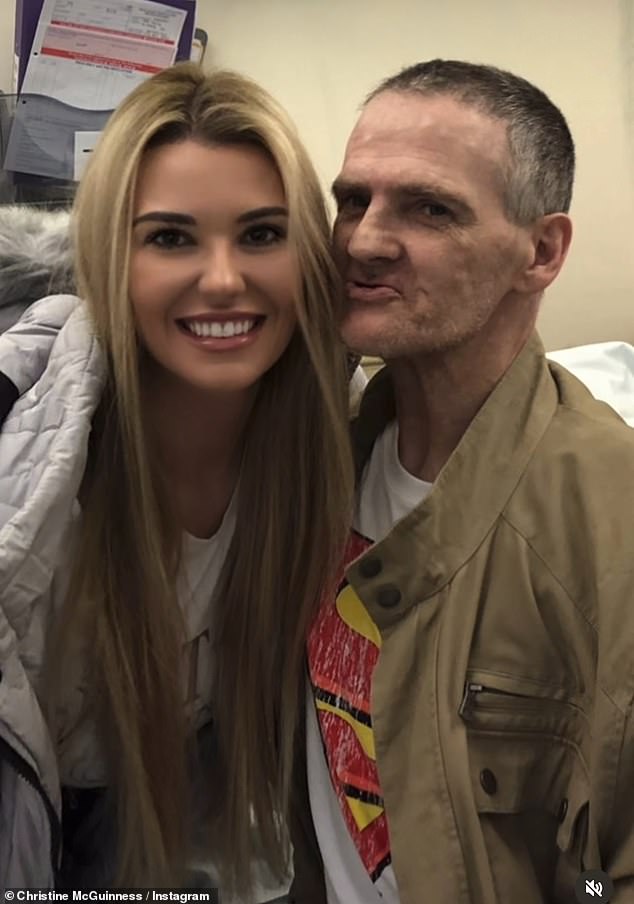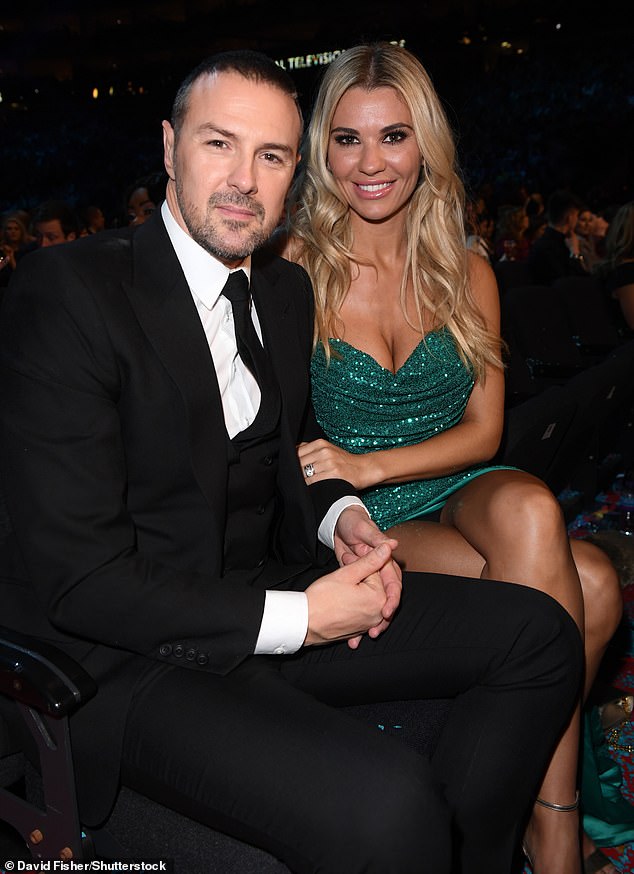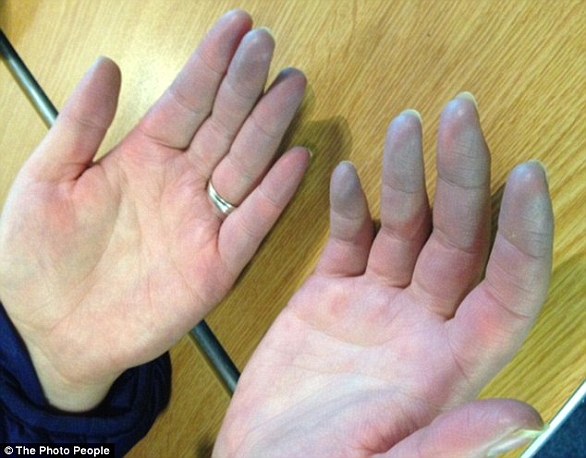Christine McGuinness was getting her daughter ready for school earlier this year when, without warning, her hands seized up. She watched helplessly as uniform buttons slipped through her fingers, zips refused to catch, hair bobbles fell to the floor.
At first, the former Real Housewives of Cheshire star thought she was just clumsy or overtired. She had, after all, been surviving on only three hours’ sleep a night. But then it happened again, and again.
The smallest surge of stress – a missed train, a last-minute change of plan, too many calls in a day – would leave her fingers white, numb and motionless.
‘It can be frustrating and upsetting,’ Christine, 37, tells Femail. ‘When it happens, sometimes I have no choice but to stop what I’m doing until my hands recover, which can be very challenging when I’m trying to balance work commitments and family life.’
After several episodes, Christine sought medical advice in May, where she was finally given an explanation: Raynaud’s syndrome. The condition, which affects 10-15% of people in the UK, causes reduced blood flow to the body’s extremities – usually the fingers and toes.
While mostly harmless, in severe cases, it can lead to complications such as painful ulcers, tissue damage – or even tissue death. Flare-ups can last from a few minutes to a few hours. Christine’s attacks, while not dangerous, disrupt her life and erode her confidence.

Christine McGuinness reveals secret health battle that makes everyday life ‘challenging’ after being diagnosed with Raynaud’s disease (pictured in March)

The former Real Housewives of Cheshire star believes it’s been caused by past sexual abuse and the trauma of her divorce
‘Sometimes I feel embarrassed or disappointed in myself, as if I’ve caused it by not managing my stress or self-care well enough,’ she says. ‘The hardest part is that they can stop me in my tracks until the symptoms settle, which leaves me feeling like I’ve let myself down.’
Raynaud’s is typically triggered by a drop in temperature, and the effects are usually mild. In rarer cases, it is caused by underlying health conditions. Christine falls into the latter camp.
‘My doctor explained in my case, Raynaud’s was linked to long-term stress, anxiety, panic disorder, and possibly PTSD (post-traumatic stress disorder),’ she says. ‘My symptoms only show up during stressful situations.’
Studies have shown that chronic stress response associated with PTSD can contribute to the development or exacerbation of Raynaud’s.
‘That came as a real shock,’ Christine adds. ‘I had heard of Raynaud’s before, but only in relation to people who experienced symptoms from the cold… I hadn’t realised just how much stress could impact my body.
‘It was as if all the strain my nervous system had been carrying finally spilled over into something I couldn’t ignore. I do feel that I may have elements of PTSD, though I can’t attribute it to just one cause.’
The diagnosis, she says, ‘has been a wake-up call to take better care of myself’.
Born in Blackpool, Christine grew up on a council estate in Liverpool to dad Johnny – a heroin addict – and mum Joanne, a cleaner. They split up when she was one. She has said that between the ages of nine and 13, she was sexually abused, and at 14, she was raped.

The smallest surge of stress – a missed train, a last-minute change of plan, too many calls in a day – would leave her fingers white, numb and motionless (pictured with ex husband Paddy McGuinness in 2021)

Born in Blackpool, she grew up on a council estate in Liverpool to dad Johnny – a heroin addict – and mum Joanne, a cleaner. They split up when she was one (Christine and father pictured)

She has said that between the ages of nine and 13, she was sexually abused, and at 14, she was raped
‘I used to pray – and it’s sad now when I think about it – I’d pray every night that I didn’t wake up in the morning,’ she has said. ‘I didn’t want to live. Just because it was so awful.’
She was bullied at school and developed anorexia as a teenager, sometimes going days without eating. Modelling and beauty pageants offered an escape – helping her to build confidence and a new life outside home. She won Miss Liverpool in 2007.
It was at a catwalk event that same year – at the Liverpool Tennis Tournament – that she met comedian and presenter Paddy McGuinness. ‘He was supposed to be watching the tennis,’ she once joked, ‘but I think he was really more interested in the fashion show.’
The pair married in 2011 and went on to have three children: twins Leo and Penelope, 12, and Felicity, nine. Five years ago, she revealed all three have autism – later saying she had been diagnosed with it too, along with attention deficit hyperactivity disorder (ADHD).
‘It was a lot to take in,’ she said at the time. ‘I broke down in floods of tears. The news conjured up a mixture of emotions and while I’m not totally shocked and it’s a relief, I’m just really sad for my younger self.’
She and Paddy split up in 2022. They did not give a reason at the time, but last month, Christine revealed that she had been the one to end it. ‘The trust was broken… so it was me that said enough is enough,’ she said on Channel 4’s Celebs Go Dating. ‘In some ways I still carry that feeling of, “Well it’s my fault because I ended it.” We had an amazing 15 years, we really did. But once the respect isn’t quite there anymore, it’s time to leave.’
When I ask Christine if she thinks PTSD has caused her Raynaud’s, she says: ‘For anyone who has lived through a difficult childhood, an eating disorder, sexual abuse, the breakdown of a marriage and a heartbreaking divorce, alongside the daily challenges that come with being a neurodivergent mum juggling work life and other personal traumas that may never be spoken about – it inevitably takes its toll. My body is showing me that.’

When I ask Christine if she thinks PTSD has caused her Raynaud’s, she says: ‘For anyone who has lived through a difficult childhood, an eating disorder, sexual abuse, my body is showing me that.’

She was bullied at school and developed anorexia as a teenager before becoming a model and marrying TV’s Paddy in 2011 (pictured in January 2019)

They went on to have three children: twins Leo and Penelope, 12, and Felicity, nine. Five years ago, she revealed all three have autism – later saying she had been diagnosed with it too
Her ADHD and autism, she adds, affect almost every part of her day. ‘I’m often on high alert, constantly juggling racing thoughts, sensory sensitivities, and difficulty switching off. Physically, it can leave me exhausted; mentally, it feels like my brain never gets a rest. Even when my body is tired, my mind keeps running.’
She takes ADHD medication to improve her ability to focus – but it is no panacea. ‘Medication can support you, but you also have to make lifestyle changes for it to really make a difference, and that’s the part I often find hardest,’ she adds. ‘The physical tension, the inability to fully relax, and the constant feeling of being “switched on” in fight-or-flight mode are still there.’
Insomnia compounds the complications of neurodivergence. For more than two decades, she has averaged between two and four hours of sleep a night. ‘On the really bad nights, my anxiety is heightened, and even simple routines can feel overwhelming,’ she says. ‘My memory is awful and it can even affect my communication.’
For Raynaud’s, she was prescribed beta blockers, which can help improve blood flow. ‘They definitely helped,’ she says, ‘but I knew I didn’t want to stay on any medication forever.’
Determined to find solutions beyond medication alone, Christine has started experimenting with alternative health practices including cryotherapy – standing in a chamber chilled to sub-zero temperatures to jolt circulation and mood – and traditional Russian banya, in which icy water plunges are followed by intense heat.
But it was an unusual treatment at a West London clinic a few weeks ago that was the most surprising. Christine saw massage therapist Sophie Yerby – whose clients include actress Sienna Miller and broadcaster Zoe Ball – for her one-hour Calm the Chaos session, designed ‘for those with neurodivergent minds’.
‘When I discovered she had created a treatment specifically for neurodivergent people, I booked her next available appointment,’ Christine says.
The treatment, based on lymphatic drainage techniques to boost circulation, uses gentle rhythmic massage, calming music, and spoken affirmations to soothe both body and mind.
‘Before the treatment, I was carrying so much stress in my body – tight shoulders, restless energy, racing thoughts,’ Christine recalls. ‘Afterwards, I felt lighter, calmer, and almost as if my nervous system had finally exhaled. It wasn’t just physical relief; it was emotional too. I didn’t expect my whole nervous system to reset in such a short space of time.’
But the real revelation came that night: Christine slept for six consecutive hours – extraordinary for someone who has struggled with insomnia since her teens. ‘It might not sound like much to some, but for me, with lifelong insomnia and three children, it was huge compared to my usual two to four hours,’ she says.
‘It’s rare for me to fully relax in any environment, but during the treatment, I genuinely switched off. Instead of my usual thousand thoughts, I was fully present – just hearing the calming affirmations and music Sophie had chosen. She’s tailored the treatment to neurodivergent needs, focusing on calming both the brain and body at the same time.’
The experience has made her rethink what support for autism and ADHD should look like. ‘Most support focuses on the mind – things like therapy, medication, and strategies. But neurodivergence affects the body too,’ Christine says. ‘Stress, sensory overwhelm, forgetfulness, brain fog, mind paralysis and living in constant fight-or-flight take a physical toll. Treatments like this address the body’s side of neurodivergence, and that’s a gap that needs much more attention.’
Christine now tries to embed some of these lessons into her everyday routine. She has begun rearranging her calendar so she is not overloaded, building in rest days – consciously tending to her own needs – and becoming better at asking those close to her for help.
‘Being a natural people pleaser and a mother, I am not used to putting myself first,’ she admits. ‘But I know not looking after myself will only hold us all back. I know I need to make more time for myself and hopefully not just when I hit burnout. Prevention is my new passion.’
Exercise and time outdoors, as long as it is quiet and not overstimulating, also help. ‘Being both autistic and ADHD is very contradictory, like trying to look after two minds, not one,’ she says. ‘While sometimes being alone in quiet really helps, music is like magic for me. Journaling helps me clear my head, even if it’s just a quick brain dump. And routine, when I can stick to it, is one of the most beneficial things to help calm my mind, body and soul.’
The holistic therapies, she believes, have already reduced her flare-ups. More importantly, they have given her tools to manage stress before it overwhelms her. ‘For me, lymphatic drainage feels like hitting a reset button,’ she says. ‘And if you’re neurodivergent and constantly overstimulated, that reset is hard to find but so beneficial when you do.’
By her own account, Christine is in a better place than she has been for years. She does not deny her past but also refuses to be defined by it. ‘I live in my present, I focus on my future, and my past is no longer part of me,’ she says. What matters most to her now is showing her children the importance of resilience.
‘I’ve learned that understanding yourself is the first step toward healing and creating a happier, healthier life,’ she says. ‘I feel incredibly grateful for that progress, and my greatest motivation is ensuring my children see the importance of resilience, self-care, and living joyfully.’
Follow Christine’s wellness journey at subs.com/christinemcguinness. Sophie Yerby treatments are available across the UK and can be booked at www.sophlondon.com













